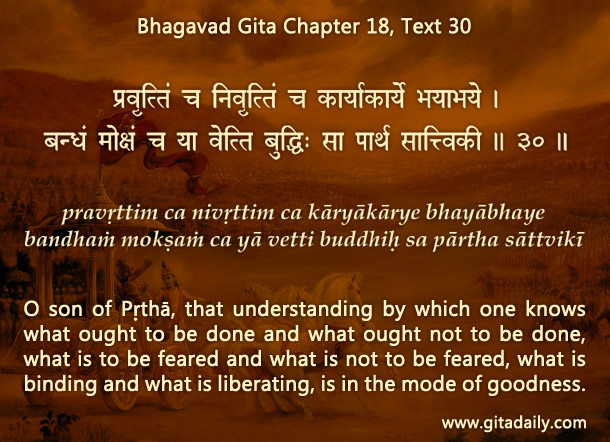The Bhagavad-gita (18.30) states that intelligence in the mode of goodness is able to view actions holistically in terms of their consequences, whether they are our obligations or not, whether they are to be feared or not, and whether they are aligned with our nature. This allows us to make decisions about which actions we should choose. This implies that whenever we function, we are meant to consider more than just our feelings while making decisions.
Those who can’t look beyond their compulsions and feelings may end up making poor choices. One of the key factors in making decisions is discerning which things should be feared and which shouldn’t. We may fear certain things and not fear others. At first glance, we may think that fearlessness is a sign of courage and fearfulness is a sign of cowardice. However, the reality is more complex. The absence of fear can lead to recklessness, and the presence of fear can lead to caution. That’s why we need intelligence to discern when fear is constructive and when it is counterproductive. The same applies to the absence of fear.
In the context of Arjuna on the battlefield, as a trained warrior with a duty to maintain social order by eliminating anti-social elements, fear of harming or killing someone is natural. However, that fear can become unhealthy if it prevents a guardian of society from giving necessary punishment to those who are dangers to humanity. Arjuna’s fear of attacking and killing his relatives, including his venerable elders, is understandable. But that fear needed to be put aside based on the knowledge that his opponents were wicked and wretched anti-social leaders.
Through Arjuna’s example, we can learn to view our fears regarding particular actions in the light of intelligence and make appropriate choices. While we may not be involved in a physical war, if we are guiding others, we may sometimes need to speak strong words that seem sharp to those whom we are guiding. The fear of speaking harsh words can be healthy in some situations where we may be unnecessarily insensitive. 3. But if strong words are necessary to wake a person from complacency and motivate them to improve, then the fear of alienating them may be unhealthy.
Deliberating carefully on various aspects of our actions, including the emotions they trigger within us, helps us make the best choices among the options that life presents us with.
Summary:
1. Intelligence in the mode of goodness considers various aspects of actions, such as whether they align with our nature, whether they are obligations, whether they feel good to do, and whether they lead to some good.
2. The emotion of fear can be a healthy deterrent if the action is unnecessarily hurtful to others, but it can also be an unwanted obstacle if the action causes a small pain for the purpose of curing a greater one.
Think it over:
1. What are the four factors that need to be considered when deciding what to do?
2. Can you think of a situation where the instinctive emotion of fear stopped you from making an unhealthy choice?
3. Can you think of a situation where fear stopped you from making a necessary choice?
***
18.30 O son of Pṛthā, that understanding by which one knows what ought to be done and what ought not to be done, what is to be feared and what is not to be feared, what is binding and what is liberating, is in the mode of goodness.



Leave A Comment